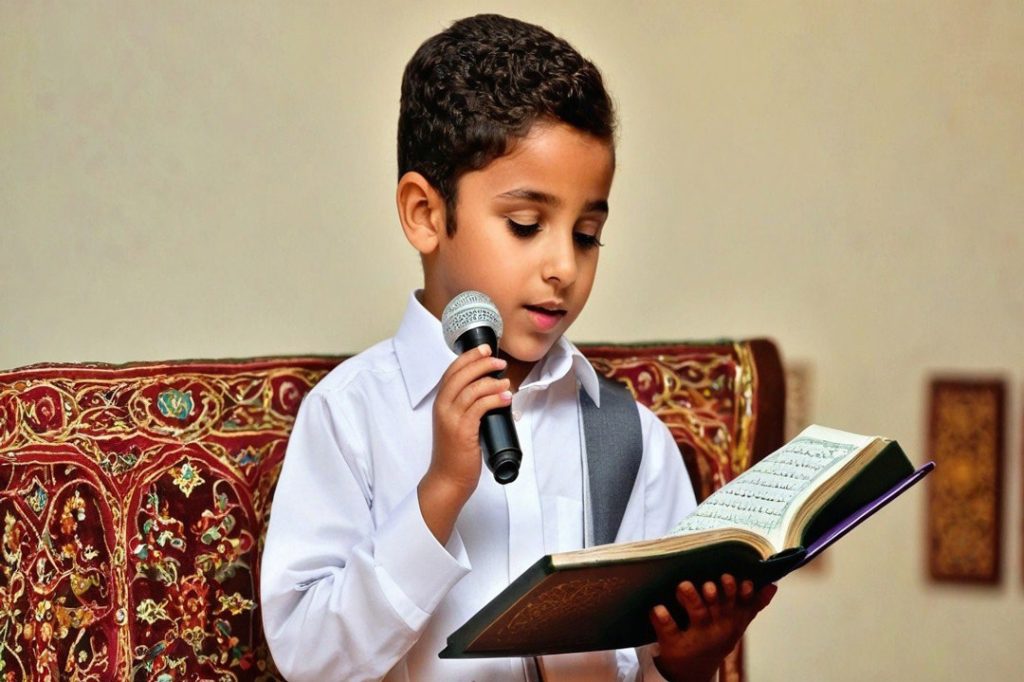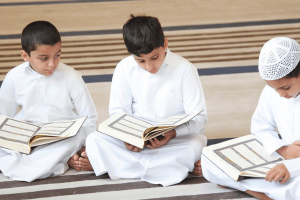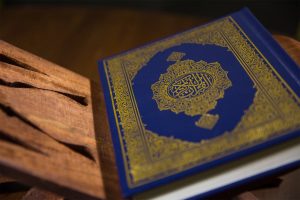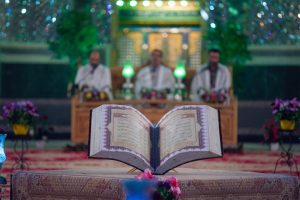Don`t ever regret deep reflection and rationalization, for thinking revives the alert heart and is a key to doors of wisdom.
Hasan ibn Ali(a)
Table of Contents
ToggleThe proper pronunciation of Makhaarij Al-Huroof is crucial in mastering the correct recitation of the Holy Quran.
This comprehensive guide will take you through various techniques and exercises to help you improve your pronunciation and enhance your Quranic recitation skills. Before diving into the techniques of Makhaarij Al-Huroof, it is important to understand its significance.
Makhaarij Al-Huroof refers to the articulation points of each letter in the Arabic alphabet. A precise understanding of these articulation points is essential for accurate Quranic recitation.
Importance of Makhaarij Al-Huroof
Makhaarij Al-Huroof , or the articulation points of the letters, is a fundamental concept in the study of Tajwid, the proper recitation of Quran.
Understanding the importance of Makhaarij Al-Huroof is essential for achieving correct pronunciation and recitation of Quran, which is of utmost significance to Muslim believers.
This essay will delve into the historical context, key figures, and the impact of Makhaarij Al-Huroof, as well as analyze influential individuals who have contributed to the field.
Additionally, various perspectives on the topic will be explored, and potential future developments related to the understanding and application of Makhaarij Al-Huroof will be discussed.
Makhaarij Al-Huroof: Historical Context and Key Figures
The concept of Makhaarij Al-Huroof has its roots in the early days of Islam, following the revelation of Quran to the Prophet Muhammad (S) in the 7th century. Quran is considered by Muslims to be the literal word of Allah, and its proper recitation is emphasized in Islamic tradition.
The preservation of the Quranic text, including its accurate pronunciation, has been a central focus of Islamic scholarship since the time of its revelation.
One of the earliest figures to make significant contributions to the study of Makhaarij Al-Huroof was Ibn Al-Jazari, a renowned 14th-century Quran reciter and scholar. He wrote extensively on the science of Tajwid, including the articulation points of the letters, and his works continue to be studied by students of Quranic recitation to this day.
Another key figure in the development of the understanding of Makhaarij Al-Huroof is Imam Al-Jazari, who is known for his influential treatise on the science of Tajwid, titled “Tayyib Al-Nashr.” In this work, he provides detailed explanations of the proper pronunciation of each letter in the Arabic language, drawing on his deep knowledge of linguistics and phonetics.
Impact and Significance of Makhaarij Al-Huroof
The correct pronunciation of Quran is not only a matter of proper recitation but is also believed to hold spiritual merit for the believer. It is viewed as a means of drawing closer to Allah and is considered a form of worship in itself.
As such, the study of Makhaarij Al-Huroof holds profound religious significance for Muslims, as it directly impacts their ability to fulfill the commandment of reciting Quran with precision and beauty.
The understanding of Makhaarij Al-Huroof also plays a crucial role in preserving the integrity of the Quranic text. Muslims believe that Quran has been preserved in its original form since the time of its revelation and that mastering the proper pronunciation of its words is essential to maintaining this preservation.
In this way, Makhaarij Al-Huroof serves as a means of safeguarding the authenticity of the Quranic recitation and ensuring its transmission from generation to generation.
Influential Individuals in the Study of Makhaarij Al-Huroof
Throughout history, numerous scholars have made significant contributions to the study of Makhaarij Al-Huroof. One such figure is Al-Khalil ibn Ahmad Al-Farahidi, an 8th-century linguist who is regarded as the founder of the science of Arabic grammar.
Another influential figure is Ibn Al-Arabi, a 12th-century Andalusian scholar who made significant contributions to the study of Tajwid. In his renowned work “Al-Tahqiq fi Kalimat Al-Quran Al-Majid,” he delves into the intricacies of Quranic pronunciation, including the correct articulation of each letter and the rules governing their pronunciation in different contexts.
Analyzing the Impact of Makhaarij Al-Huroof
The understanding of Makhaarij Al-Huroof has a profound impact on the recitation of Quran and its transmission within Muslim communities. It is through the mastery of the articulation points of the letters that individuals are able to achieve the melodious and accurate recitation that is highly prized in Islamic tradition. Moreover, the study of Makhaarij Al-Huroof fosters a deep appreciation for the linguistic beauty and precision of the Quranic text, enriching the spiritual experience of those who engage with its recitation.
On the other hand, the emphasis on Makhaarij Al-Huroof has at times led to a narrow focus on technical accuracy at the expense of understanding the deeper meanings and messages conveyed in Quran. Some scholars have argued that an excessive preoccupation with the mechanics of recitation can detract from the spiritual and moral guidance that Quran offers, potentially leading to a superficial engagement with its content.
Future Developments and Perspectives on Makhaarij Al-Huroof
Looking ahead, the study of Makhaarij Al-Huroof is likely to continue to play a central role in the education and practice of Quranic recitation. As technology advances, new tools and resources may be developed to facilitate the learning and application of Makhaarij Al-Huroof, making it more accessible to a wider audience. Furthermore, an increased emphasis on the spiritual and moral dimensions of Quranic recitation may serve to balance the technical aspects of Makhaarij Al-Huroof, ensuring that both form and content are given their due consideration.
In conclusion, the understanding of Makhaarij Al-Huroof is of paramount importance in the study of Tajwid and the proper recitation of Quran. Its impact on the spiritual, linguistic, and cultural dimensions of Islamic practice cannot be overstated.
While it is essential for preserving the authenticity of the Quranic recitation and transmitting it faithfully, there is a need to ensure that the study of Makhaarij Al-Huroof is balanced with a deeper engagement with the meanings and messages of the Quran.
As the field continues to evolve, it is important to maintain a holistic approach that encompasses both the technical and spiritual aspects of Quranic recitation.

Basic Techniques for Learning Makhaarij Al-Huroof
- Listening
Listening plays a vital role in acquiring Makhaarij Al-Huroof skills. By actively listening to native Arabic speakers and imitating their pronunciation learners can develop a better understanding of the correct articulation points. Listening also helps in recognizing the subtle differences between similar sounds enhancing overall pronunciation accuracy. - Mimicking
Mimicking plays a crucial role in the learning process as it allows learners to imitate the sounds made by proficient speakers. By observing and reproducing these sounds learners can develop a sense of the correct placement of the articulatory organs. This technique enables learners to train their muscles and achieve the desired pronunciation accuracy. - Proper Positioning
Proper positioning of the articulation points ensures accurate pronunciation and clarity in speech. It contributes to the beauty and eloquence of the Arabic language particularly in the recitation of Quran. Additionally, it helps the learner avoid common pronunciation errors and enhances their ability to comprehend and communicate effectively in Arabic.
Practical Exercises for Improving Makhaarij Al-Huroof
- Tongue Twisters
Engage in tongue twisters specifically designed to target the Makhaarij Al-Huroof, such as repeating “حَىيٌ حَىنٌ حَىٍ” multiple times. - Word Segmentation
Practice pronouncing individual words, focusing on correctly articulating their Makhaarij Al-Huroof. - Recitation Reflection
Record and listen to your recitation, reflecting on the accuracy of your Makhaarij Al-Huroof.
Common Challenges in Learning Makhaarij Al-Huroof
- Nasalization:
Some learners may struggle with differentiating between the nasal sounds of Arabic letters, such as ص and س. - Ghunna
Pronouncing the ghunna, a nasal sound caused by the merging of two letters, can be challenging for beginners. - Silent Letters
One of the initial challenges is identifying which letters are silent in a word. Arabic words often contain silent letters that are not pronounced making it essential for learners to recognize and differentiate them. This can be particularly challenging for non-native speakers who are not accustomed to the patterns and rules of Arabic pronunciation.
For example, the word “سكينة” (sakeena) meaning tranquility has a silent “ي” (ya) in the middle.
Students may mistakenly pronounce it as “sakeena” instead of “sakina” due to the lack of awareness of silent letters.

Tips for Effective Practice
- Consistency is Key
Consistency is crucial in practice learning as it allows learners to establish a routine and reinforce their understanding of Makhaarij Al-Huroof. Regular and repeated practice enables learners to internalize the correct pronunciation of each letter making it easier for them to produce accurate sounds during speaking. Without consistency learners may find it challenging to develop muscle memory and fluency in the pronunciation of Arabic letters. - Seek Guidance
Enlist the help of a knowledgeable teacher or mentor who can guide you in refining your Makhaarij Al-Huroof. - Record Yourself
Record and closely analyze your recitation to identify areas for improvement and measure progress.
To conclude, Makhaarij Al-Huroof plays a vital role in Quranic recitation,especially in tajwid that it means set of rules governing the way in which the words of the Quran and mastering it is an ongoing journey.
By employing the techniques, exercises, and tips outlined in this guide, you will be well-equipped to enhance your pronunciation skills and deepen your connection with Quran.

















